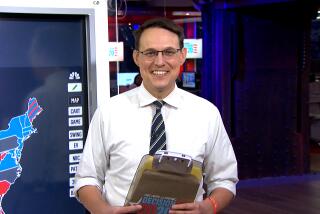Olbermann’s partisan? We’re shocked, shocked!
- Share via
The most troubling thing about the Keith Olbermann affair is just how quaint and beside the point the NBC network rule he broke now appears.
The MSNBC cable news commentator returned to the air Tuesday night after a two-day suspension without pay for violating an NBC rule against contributing to political candidates without permission. The former sports broadcaster turned rancorous liberal shouter gave a total of $7,200 to three Democratic congressional candidates in the midterm elections. His superiors at NBC learned of the donations when a reporter for another news organization inquired about one of them. Olbermann freely admitted the contribution and told his bosses that he’d made two others. One of them — to Rep. Raul M. Grijalva — came on the same day the Arizona Democrat appeared on “Countdown With Keith Olbermann,” the highest-rated show on MSNBC.
The cable operation’s president, Phil Griffin, last week announced that Olbermann would be suspended without pay for violating NBC’s rule against unapproved political donations. In a letter to his viewers Monday night, Olbermann expressed his unhappiness with the punishment, saying he “learned of that suspension through the media.” It hardly mattered, because by Monday afternoon Griffin had decided that missing two broadcasts was sufficient penalty and that MSNBC’s regularly scheduled programming would resume Tuesday night.
If the conduct of everyone involved seems to you somehow silly, that’s because it is.
MSNBC seemed permanently mired in third place among the cable news networks when it hit on the idea of consciously counter-programming Rupert Murdoch and Roger Ailes’ Fox News. If Fox would be a mouthpiece for angry conservatives and the Republican Party, MSNBC would stud its schedule with enraged liberals and Democratic Party partisans. It worked. MSNBC is now the second-rated cable news outlet in the crucial prime-time slots.
So, having consciously recruited and encouraged a level of open partisanship and biting bias that on some nights tops even Fox, Griffin and his confreres now are surprised that the personalities they recruited and promoted behave like bitter partisans rather than journalists or traditional commentators? Please. It’s all a bit like Claude Rains’ Capt. Renault in “Casablanca,” closing down Rick’s bar as the croupier hands him his winnings: “I’m shocked, shocked to find that gambling is going on in here.”
Griffin and MSNBC look ridiculous enforcing this particular rule on Olbermann not because it’s a deficient ethical stricture but because they long ago abandoned what it was designed to support — a fair-minded and balanced approach to reporting and analyzing the news. What are we to make of a network that had Olbermann anchor its election-night broadcast and that features one of his colleagues, TV writer Lawrence O’Donnell, who last week declared on the air: “Liberals amuse me. I am a socialist. I live to the extreme left”?
Those Americans who believe in the centrality of the news media’s contribution to our democracy must contend with a sobering historical fact: On the eve of the Civil War, Americans were, on a per capita basis, the world’s most voracious newspaper readers. By the measure of the time, we were a society saturated in media. But rather than arrest the slide into fratricide, a blindly partisan press helped push the nation into war.
In other words, the mere existence of a free press guarantees nothing; what the press chooses to do with its freedom is what matters.
Similarly, complaints that change born of technical innovation inevitably squeezes sobriety and balanced reflection from the media go back more than a century. In the late 1850s, for example, commentators worried that telegraphic dispatches transmitted on the newly laid Atlantic cable had created an appetite for sensational and fragmentary reports that displaced the long, knowledgeably reported essays from the special European correspondents on whom leading U.S. papers had relied. In fact, technology of its own accord determines nothing; the purpose to which the press puts it determines a great deal.
To the extent this latest affair signifies anything other than another act in Olbermann’s own peculiar ego theater or another example of his employer’s desperate venality, it is as a melancholy reminder. The Fox and MSNBC adaptations to the 24-hour news cycle ought to concern us not because they’re unsettlingly innovative but because they represent a regression to a time when the American press discredited itself with a bitter, ultimately tragic, partisanship.
More to Read
The biggest entertainment stories
Get our big stories about Hollywood, film, television, music, arts, culture and more right in your inbox as soon as they publish.
You may occasionally receive promotional content from the Los Angeles Times.










